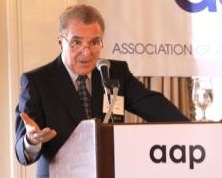Even as sales of e-books and e-readers grow dramatically, Barnes & Noble is "committed to the future of our stores," chairman Len Riggio said yesterday in a speech at the annual meeting of the Association of American Publishers yesterday in New York City. If anything, he added, "Our emergence as major digital player enables us to continue to support retail stores and make them stronger." Without using the word synergy, he said that Nook e-reader owners are proving to be avid readers--and in many cases, this applies to print books as well as e-books. Loyalty club members who own the Nook "are buying 60% more units in total compared to members who don't own the Nook, and they're spending 120% more," Riggio said, adding that many B&N customers browse the shelves, see a book they want and then download the digital version immediately. Some buy both the digital and printed versions of the same book.
Without using the word synergy, he said that Nook e-reader owners are proving to be avid readers--and in many cases, this applies to print books as well as e-books. Loyalty club members who own the Nook "are buying 60% more units in total compared to members who don't own the Nook, and they're spending 120% more," Riggio said, adding that many B&N customers browse the shelves, see a book they want and then download the digital version immediately. Some buy both the digital and printed versions of the same book.
Other booksellers will succeed, too, Riggio continued. "Smaller format and specialty stores will do well," he said. "As they always do, independents will adapt." But he predicted that mass merchants, "who represent half of all book sales," will reduce shelf space.
Saying that everyone in the book industry "does important work," Riggio stated that the goal of Barnes & Noble has always been to "serve the aspirants in this world, not just the already arrived. Books are the building blocks of society and everyone should embrace the idea that they should be widely available. A world without bookstores not a place we want to live, and we don't want that." He also said, "Whether you see our stores as portals, incubators, showrooms, our stores loom very important. They make a statement of who we are as a people and represent the ideal for all those who aspire."
Riggio seemed to wonder at the digital revolution: "Who could imagine that an entire bookstore could exist in your pocket?" he asked. Nowadays booksellers can offer 20 million e-books or more, "and no e-book will ever go out of print. Ours has always been a long-tail business, but the tail has gotten even longer."
The digital market is growing "exponentially faster than most people think" and will continue to grow without cannibalizing sales, he maintained. "Too many of us see bookselling as a zero sum game," he said. "Some say there is a limit to how many books people will read and buy." But now "we're realizing that more publishers, bookstores, formats all mean more sales. Markets are readily expandable."
Riggio urged publishers to rethink what and how they sell. For one, they can immediately add thousands of books whose copyright has lapsed to their catalogues. More important, they can publish shorter works, chapters, novellas, a single short story. "Who says all books are read cover to cover?" he asked. He pointed to free information on the Internet that's hard for a consumer to navigate. "Someone needs to rationalize this content, and you've done that throughout history. You can do more of that." He suggested also that publishers "rethink the world of color publishing," which might become a profit center now that devices like the Nook Color display color well. Last but not least, he advised publishers, "Think about books for which updates can be sold." He envisioned a scenario whereby authors could establish a dialogue with readers through updates that could go to everyone who purchased the authors' e-books.
He stressed that publishers and booksellers will always have a role because for consumers seeking content in a digital world with so much content available is "like finding a small needle in a large haystack. This virtually guarantees the existence of booksellers and publishers."
Noting that he addressed the AAP 11 years ago, he recalled the Rocket eBook, which was ahead of its time. "It was a revelation: we sold 175,000 downloads of Stephen King's new work in eight hours," he said. "Imagine how different things would have been if we all had led on this rather than followed."
In any case, now that the digital revolution has come, Riggio said he enjoys the change sweeping the book world. "I've never seen anything like this," he said. "The company and I get dizzy because there is so much to do and so much is possible. I'm more excited about the future of bookselling and publishing than I've ever been in my life." And the challenge is much greater than any challenge he's ever faced, including creating superstores. "For super bookstores, there wasn't much to figure out," he said. "Create a grand emporium, offer a full catalogue, the wow factor, offer a cup of coffee and a restroom. This is much larger." Smiling, he added, "I don't really want to be 40 again, but now is the first time I ever felt like it."--John Mutter

